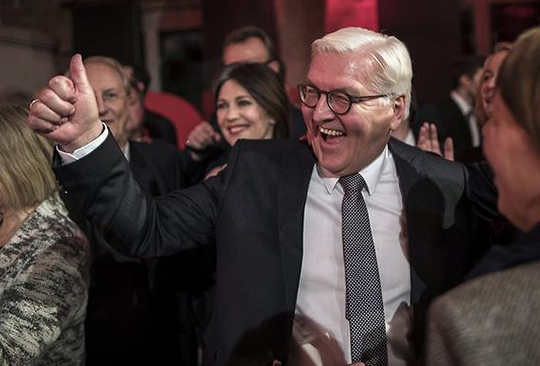Berlin, Feb 12: Billed as Germany's "anti-Trump", centre-left former foreign minister Frank-Walter Steinmeier was elected today as the new ceremonial head of state. The 61-year-old, who regularly polls as Germany's most popular politician, will represent the EU's top economy abroad and act as a kind of moral arbiter for the nation.

His Social Democrats (SPD) hope the appointment will boost their fortunes just as their candidate Martin Schulz, the former European parliament president, readies to challenge Chancellor Angela Merkel in September elections. Steinmeier received 931 of 1,239 valid votes after Merkel's conservatives, lacking a strong candidate of their own, agreed to back him to replace incumbent Joachim Gauck, 77, a former pastor from ex-communist East Germany.
The vote was held in Berlin's glass-domed Reichstag building by a special Federal Assembly, made up of national lawmakers and electors sent from Germany's 16 states -- among them deputies but also artists, writers, musicians and national football coach Joachim Loew. With his snowy white hair, round glasses and dimpled smile, Steinmeier is one of Germany's best-known politicians, having twice served as top diplomat under Merkel for a total of seven years.
Though the trained lawyer is usually measured in his speech, in the thick of last year's US election campaign Steinmeier labelled Donald Trump a "hate preacher". After the billionaire won the White House, Steinmeier predicted relations would get "more difficult" and said his staff were struggling to detect any "clear and coherent" foreign policy positions from Trump.
As Steinmeier has prepared for the new post, which he assumes on March 19, he has vowed to serve as a "counterweight to the trend of boundless simplification", calling this approach "the best antidote to the populists". The Berliner Morgenpost newspaper judged that Steinmeier looks set to be "the anti-Trump president".
Steinmeier is only known to have lost his cool once, in 2014, when he yelled at Berlin protesters who had accused him of being a "warmonger" over his Ukraine policy. The outburst was so unusual it became a minor YouTube hit. A policy wonk by nature, Steinmeier served as advisor and then chief of staff to Merkel's predecessor, the SPD's Gerhard Schroeder.
In 2009, Steinmeier ran against Merkel and lost badly, only to return years later to serve in her cabinet. Political scientist Michael Broening of the SPD's think-tank the Friedrich Ebert Foundation said that "as foreign minister, Steinmeier often acted as a voice of reason, bridging gaps and bringing people together". "It is hardly surprising that Steinmeier has branded himself as the essential anti-Trump," he added.
Steinmeier is well known in the world's capitals, but his appointment worries some in eastern Europe, who see him as too soft on Russian President Vladimir Putin. He raised eyebrows with NATO partners last year when he criticised a military exercise in Poland as "sabre rattling". Having Steinmeier move into the presidential Bellevue Castle in Berlin has emboldened the SPD.
After years in the shadow of Merkel, the Social Democrats are smelling blood as the chancellor faces deep divisions within her own conservative camp, and the rise of the hard-right populist party Alternative for Germany (AfD) after opening German borders to a million asylum-seekers since 2015. Since Schulz took over the candidacy in late January, the SPD has risen sharply in the opinion polls.






Comments
Add new comment